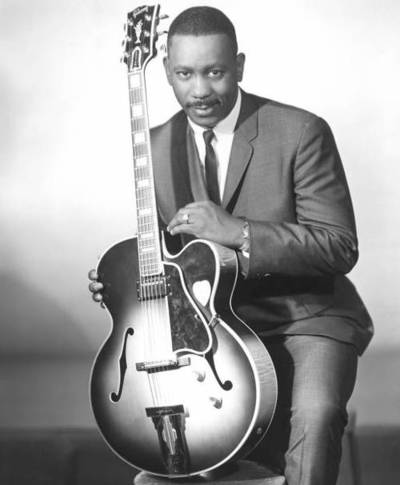Wes Montgomery (John Leslie Montgomery)

Wes Montgomery was born in Indianapolis, Indiana. According to NPR Jazz Profiles “The Life and Music Of Wes Montgomery”, the nickname “Wes” was a child’s abbreviation of his middle name, Leslie. He came from a musical family; his brothers, Monk (double bass and electric bass) and Buddy (vibraphone and piano), were jazz performers. The brothers released a number of albums together as the Montgomery Brothers. Although he was not skilled at reading music, he could learn complex melodies and riffs by ear. Montgomery started learning the six-string guitar at the relatively late age of 20 by listening to and learning the recordings of his idol, guitarist Charlie Christian; however, he had played a four string tenor guitar since age twelve. He was known for his ability to play Christian’s solos note for note and was hired by Lionel Hampton for this ability. Wes Montgomery toured with Lionel Hampton early in his career; however, the combined stress of touring and being away from family took him back home to Indianapolis. To support his family of eight, Montgomery worked in a factory from 7:00 am to 3:00 pm, then performed in local clubs from 9:00 pm to 2:00 am. Cannonball Adderley heard Montgomery in an Indianapolis club and was floored. The next morning, he called record producer Orrin Keepnews, who signed Montgomery to a recording contract with Riverside Records. Adderley later recorded with Montgomery on his Pollwinners album. Montgomery recorded with his brothers and various other group members, including the Wynton Kelly Trio which previously backed up Miles Davis.
Following the early work of swing / pre-bop guitarist Christian and gypsy-jazz guitarist Django Reinhardt, Wes joined Tal Farlow, Johnny Smith, Jimmy Raney, and Barney Kessell to put guitar on the map as a bebop / post-bop instrument. While these men generally curtailed their own output in the 1960s, Montgomery recorded prolifically during this period, lending guitar to the same tunes contemporaries such as John Coltrane and Miles Davis were recording. John Coltrane asked Montgomery to join his band after a jam session, but Wes Montgomery continued to lead his own band. Boss Guitar seems to refer to his status as a guitar-playing bandleader. He also made contributions to recordings by Jimmy Smith. Jazz purists relish Montgomery’s recordings up through 1965, and sometimes complain that he abandoned hard-bop for pop jazz toward the end of his career, although it is arguable that he gained a wider audience for his earlier work with his soft jazz from 1965 to 1968. During this late period he occasionally turned out original material alongside jazzy orchestral arrangements of pop songs. In sum, this late period earned him considerable wealth and created a platform for a new audience to hear his earlier recordings. On the morning of June 15, 1968, while at home in Indianapolis, Indiana, Wes Montgomery awoke and remarked to his wife that he “didn’t feel very well.” He soon collapsed, dying of a heart attack within minutes. 45 years old at the time of his death, Montgomery had just returned from a tour with his quintet and was at the height of his fame, having attained a degree of popular acceptance that few jazz artists in that era achieved. Montgomery’s home town of Indianapolis later named a park in his honor.
Born
- March, 06, 1923
- USA
- Indianapolis, Indiana
Died
- June, 15, 1968
- USA
- Indianapolis, Indiana
Cause of Death
- heart attack
Cemetery
- New Crown Cemetery and Mausoleum
- Inianapolis, Indiana
- USA



